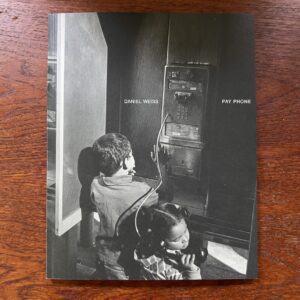JTF (just the facts): A total of 12 black and white photographs, framed in black and matted, and hung against grey walls in the single room gallery space. All of the works are vintage gelatin silver prints, made between 1975 and 1978. Physical sizes are roughly 16×13 or 17×14 (or reverse). (Installation shots below.)
Comments/Context: One of the dangerous temptations of art history is the all too natural tendency to reduce an artist’s entire lifetime of output down to his or her best or most notable work. This thumbnailing of artists allows us to slim decades of activity down to a handy simplified summary that in the best case captures both the essence of what made that artist important, and highlights the key junctures where influences and connections tie that work back into the fabric of the art historical timeline. And for artists that feverishly worked for a short period of time or that generally stayed within one style during their entire career, this reductionism isn’t always unwarranted – it can clarify an artist’s key contributions and package them up in a form that encourages easy communication.
But for artists like the master Japanese photographer Daido Moriyama, limiting our discussion of his art to just the 1960s and early 1970s, particularly the Provoke and Farewell to Photography bodies of work, only gives us a partial view of the sweep of his career. And just like forcing a rock band to eternally play only their greatest hits, boxing Moriyama into are-bure-boke misses out on much of the richness and nuance of the overlooked in-between periods, where his ideas were in formation or evolution and lesser known works signaled attempts at new directions.
This exhibit unearths a selection of unpublished vintage prints from the late 1970s, when Moriyama was arguably a bit estranged from all that had come before and was looking for alternate paths forward. While posters, billboards, and bold urban signage had always been part of what caught his eye on the streets, these pictures delve into that interest with more focused attention, providing a vehicle for the undercurrent of pessimism which was percolating around in his mind.
As a body of work, Tokyo Meshed World investigates the East/West cultural clashes increasingly to be found in Tokyo, and uses interrupted and composite views to articulate a sense of uneasy mismatch and veiled interaction. Many of these pictures are anchored by a dominant female figure – an overly large face drawn from a billboard, a mannequin from a shop window, or a nude figure from the nearby advertising for sex shops and adult shows. The towering faces of Marilyn Monroe and Brigitte Bardot lookalikes peer down from the sides of buildings, always seen in stylized painted fragments, intermingled with local language messages and dark shadows like seductive giants with a hint of transgressive menace. Nude theater ads seem to jump out into the night, their backlit displays inviting passersby into dark hallways, sexualizing everyday street life. And vast arrays of pop star headshots and cacophonous neon lights continue this merging of image-soaked worlds, enticements and come-ons of all kinds ringing through the air.
While many of these images wander through the darker registers, stylistically, they are neither blurred nor particularly grainy, as in Moriyama’s previous work. Instead, he seems to have become interested in the dots of the halftone printing process used on the billboards, where the mesh of spots shifts and coalesces into recognizable forms, like rough photocopies or Warhol’s silkscreens. Billboards are allowed to dissolve, and street-side windows are used as scrims and mirrors, fogged and shadowed reflections providing imperfect, mediated views of what’s inside. When seen off-kilter or with a skewed camera angle, these compositional elements introduce uncertainty, making us feel Moriyama’s sense of alienated distance from the energy of the streets. His photographs feel like searches, where his found combinations of the modernizing urban Tokyo of the 1970s see mostly tawdriness, emptiness, and the hollow hustle of commercial sex. The grim faced portrait of the salaryman in hat and dark glasses seems to capture all the subtleties of this mood in just one lonely frame.
What comes out most clearly in this group of photographs is a simmering rumble of frustration, something different from the angry rebellion, the performative activism, and the cultural stylization of his earlier years. Many of the images are bisected in one way or another, and the two halves seem unwilling to resolve or reconcile, leaving us with a tense jangle of weary dissatisfaction – these are pictures that are often divided against themselves, unwilling to tune out the everyday contradictions we normally let go.
A picture of a painted circle target in a shop window with a dark shadow cast across it captures the quiet despair of this whole project. Perhaps Moriyama is shooting himself, both literally and metaphorically, the artist trapped in a dispiriting hall of mirrors. While Tokyo Meshed World may not be Moriyama’s most memorable or enduring work, I certainly came away impressed by its raw emotional tenor. There is real internal struggle in these photographs, and the city is the pliable host for that angst. The surfaces may be sexy and enticing, but in Moriyama’s late 1970s mindset, that seduction is very much less than satisfying.
Collector’s POV: The prints in this show are priced at $30000 each. Morimaya’s photographs are generally available at auction, with recent print prices generally ranging from roughly $2000 and $70000.











